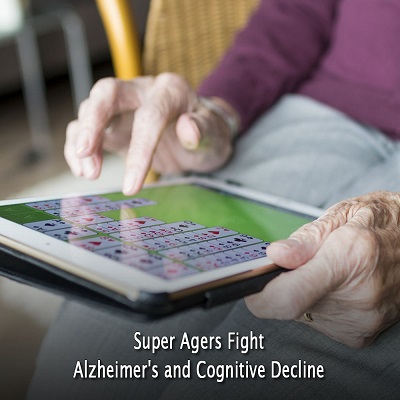 Sadly, we have all seen senile senior citizens. After all, many senior-aged people become weaker, mentally and physically. Alternatively, when we see someone in their 80s or 90s, who is as sharp as a tack and quicker with their tongue than ourselves, we are shocked, but in a good way! Wow, to be as alert as they are at their age! This person is a super-ager.
Sadly, we have all seen senile senior citizens. After all, many senior-aged people become weaker, mentally and physically. Alternatively, when we see someone in their 80s or 90s, who is as sharp as a tack and quicker with their tongue than ourselves, we are shocked, but in a good way! Wow, to be as alert as they are at their age! This person is a super-ager.
Super-agers possess cognitive abilities that are typically found in individuals decades younger than they are, and Alzheimer’s disease and dementia don’t pose such a huge risk for them at the age they now are.
Aging and Cognitive Decline
Our memory and ability to perform complex mental activities can diminish as we age. This cognitive decline can be attributed to the brain’s health changing and atrophy. Just as our muscles atrophy, so does our brain. That means our brain shrinks in size.
Aside from brain atrophy, levels of neurotransmitters also decline over time, which makes it more difficult to assimilate new information and recall details, which affects memory and cognition.
These negative changes in the brain increase the risk of developing Alzheimer’s disease or other forms of dementia. Combined with genetic, environmental, and lifestyle factors, the chances of being diagnosed with Alzheimer’s disease increase as we age. While age itself is not the cause of Alzheimer’s, age-related brain atrophy can contribute to cognitive problems.
For years, scientists, doctors, and the general population have been fascinated with aging and how and why it happens, and how we can stop or reverse it. Wouldn’t we all love to stay young, or feel younger, while on this earth? Well, super-agers seem to defy many of the natural effects of growing old.
Of course, there have been many studies on brain health and aging, but we’re not going to look into the in-depth research on how and why a super-agers brain is better than someone else of their age. Know that it just is! It’s bigger, (yes bigger), healthier and stronger in many intricate ways. This is why their brain is better at retaining information and complex mental functions. A super-ager’s brain is bigger because it shrinks at a much slower pace than cognitively ‘normal’ adults.
How Super Agers Fight Cognitive Decline
There can be several factors that help super-agers fight cognitive decline, however, their lifestyle choices play a vital role in keeping their brain sharp and super healthy. Here are some ways to sharpen your brain as they do.
Exercise the Brain
One way to ensure our brain is in great shape is to exercise it. Like a muscle in the body, the brain becomes stronger the more we challenge it. We should look for new ways to stimulate the mind. For example, simple activities that promote critical thinking such as solving puzzles. This can help engage the brain and prevent memory loss.
You can also exercise your brain with friends. Socializing with people who share common interests as you is another way to challenge your brain.
Keep Moving
Exercising the body not only keeps you fit but also sharpens your brain. By exercising you are increasing your oxygen intake. The oxygenated blood flows to the brain too, keeping you mentally alert. Think about when you are tired and lethargic. You begin to yawn to get more air. You get sleepy and your body and brain begin to slump. If you exercise, you are oxygenated and feel alive!
The best form of exercise is something you enjoy. That way you will keep doing it. If you hate exercising, just make sure you get up and walk every single day. Enjoy the sun and the fresh air and ultimately a longer, healthier life.
Eat a Healthy Diet
Your diet determines your vitality. It is a healthy one, that’s great. If it’s not, it’s time to change it. Eating healthy foods and having healthy eating habits largely determine your physical and mental health. Your brain needs to be fed healthy brain foods!
Super-agers have seemed to find the answer to living a long healthy life. We should all watch and do what they do. Their sharp brain should be proof that they are doing something right. Is staying young all in the mind, or in daily habits too?






